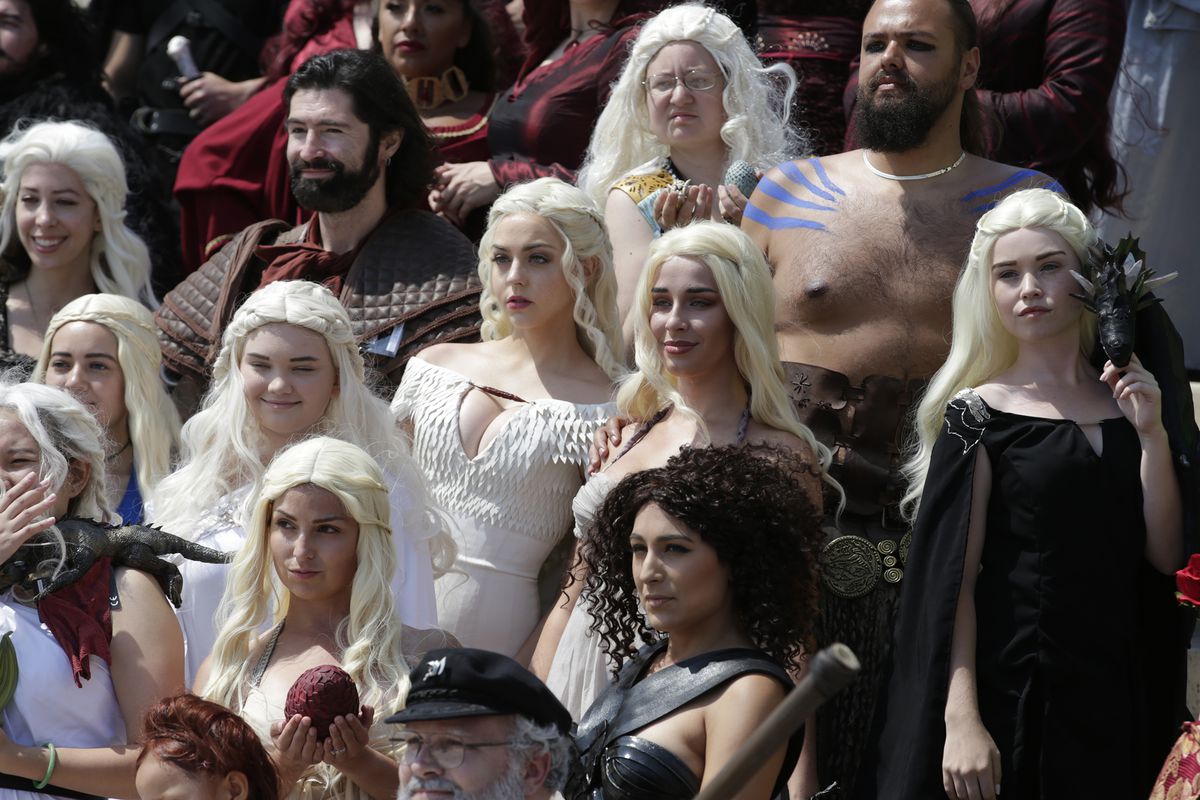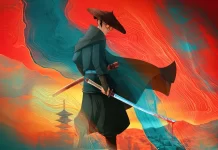If you search “mother of dragons” on Etsy, you get more 17,000 results: tote bags and pins and wine glasses and onesies. “Khaleesi” gets you another 10,000, though some of those are actually for Arya Stark merch. On Pinterest, the same searches lead to countless instructions on how to craft the perfect Dothraki-inspired braid or execute flawless cosplay. On Tumblr — well, don’t even get Tumblr started.
All this devotion and merchandise is dedicated to Daenerys Targaryen, a.k.a. khaleesi, the mother of dragons, would-be queen of the Seven Kingdoms, and holder of a bunch of other impressive titles. Dany, as fans call her, is just one of the several dozen main characters of HBO’s runaway hit Game of Thrones, but even in a world where people go on GoT-inspired vacations and plan GoT-themed weddings, the tiny blonde queen is at the forefront of fan obsession. From protest signs to literal baby names — yes, people are naming their children Khaleesi — Daenerys (or one of her many nicknames) has become shorthand for an often superficial notion of women’s empowerment. Even Elizabeth Warren is a khaleesi stan.
It’s not like Game of Thrones is lacking in dynamic, complex women characters. Sansa and Arya Stark, Brienne of Tarth, Lyanna Mormont, and even Cersei Lannister, one of the show’s most obvious villains, are arguably all just as strong as Dany. (And that’s only counting the women who are still alive eight seasons in; most of the others are dead now.) Complicating things even further: In the final season, Daenerys’s moral judgment seems to be in question. Given the sheer number of characters on the show, the legions of real-life women who identify with Daenerys is striking. Why do so many people see themselves in the mother of dragons?
Daenerys’s story subverts the hero’s journey
At the beginning of the series, Daenerys was the show’s clear underdog. Her father, the king, had been murdered by the Lannisters, and her family had been run out of their ancestral home by the Baratheons. She was forced to live in exile with her abusive older brother, the only living relative she knew of, who sold her to the leader of a band of horse-riding nomads as part of his attempt to reclaim the throne. While the other women characters were fairly one-dimensional — Catelyn was a dutiful mother, Cersei was cruel and power-hungry, Arya was a tomboy, Sansa was a lovestruck teen, and every other woman on the show was basically an extra or a plot device — Daenerys was dynamic and her struggle was compelling.
An essay published in the anthology Women of Ice and Fire: Gender, Game of Thrones, and Multiple Media Engagements helps explain Dany’s feminist appeal. The essay, written by Rikke Schubart, a film scholar and professor at the Institute for the Study of Culture at the University of Southern Denmark, focuses on Daenerys’s character arc in the show’s first season. The mother of dragons, Schubart writes, “can be seen as a model for creative experimentation and even female agency and liberation.”
She embarks on an archetypal hero’s journey with a twist: Instead of learning to humble herself, as heroes usually do, Dany has to learn to assert herself in a universe dominated by men. “She combines emotions and elements that are stereotypically gendered male and female (male pride, a male dragonslayer, a damsel in distress) and then claims agency for herself and others,” Schubart writes. (Schubart, for her part, told me she thinks Dany won’t be sitting on the Iron Throne at the end — and added that she doesn’t want her to.)

By the end of the first season, Daenerys loses her brother (her husband kills him by dumping a vat of molten gold on his head), her husband (a witch kills him), and her infant son (ditto), but gains some valuable things in her quest for the Iron Throne: three baby dragons that she hatched by walking into her husband’s funeral pyre, as well as the unwavering devotion of her late husband’s army, all of whom watched her walk into a fire and emerge with the aforementioned dragons. She goes on to conquer a bunch of cities, free the people who are enslaved there, and generally stick up for the poor and the downtrodden while amassing an even greater army. It’s all very nice, and the show’s audience ate it up.
“Unlike the rest of Game of Thrones’ highborn women,” one critic wrote for the Atlantic in 2012, “Daenerys seeks the Iron Throne not for a son or husband, but for herself. And most significantly, Daenerys is powerful in a way directly and singularly tied to her womanhood.”
Game of Thrones spent many, many seasons setting up Dany as an unambiguously feminist hero. Unlike the show’s other main characters, she’s not just a lady or a princess or even a queen — she’s a khaleesi, a Dothraki warrior queen. (She’s also the only khaleesi who wasn’t shipped off to the show’s equivalent of a retirement home for widowed queens after her husband’s death; like many of Dany’s narratives, this involved arson.) Using the show’s logic, khaleesi becomes shorthand for all sorts of things. A khaleesi is strong; a khaleesi is empowered; a khaleesi doesn’t take shit from men and is willing to burn one or two of them alive if they get in her way.
Why and how real women began identifying with Daenerys
The showrunners’ positioning of Daenerys as a feminist foil to Game of Thrones’ more ruthless characters explains the proliferation of Dany-related merch: If you buy this $20 shirt or this $2,700 pendant, you, too can be a khaleesi. You aren’t just a tired, overworked mom: you’re the “mama of house messy, first of her name, the unslept queen of the coffee, khaleesi of the naptime, keeper of the snacks,” etc. Daenerys merch is, to be clear, harmless, if incredibly corny.
Daenerys fandom is everywhere. Stassi Schroeder’s fans call her “khaleesi” even though she doesn’t own a single dragon. Images of Dany’s scaly children burning men alive are perfectly suited to the pseudo-misandrist, “men are trash” discourse that has permeated pop culture feminism for the past decade.
But Dany worship has also infected political discourse. In the lead-up to the 2016 presidential election, Hillary Clinton was compared to the mother of dragons on more than one occasion. (One since-deleted tweet referred to Clinton as “Hillary Stormborn … 1st of her name, Unburnt, the Silver Queen, Mother of LGBT & Breaker of Chains.” It also featured Clinton’s face superimposed onto actress Emilia Clarke’s body, emerging naked from the funeral pyre with a baby dragon on her shoulder. Celebrities like Jessica Chastain and Clarke herself shared the image on Instagram.)
After a particularly good performance by Clinton in a debate against Trump, the Daily Beast claimed she went “full khaleesi, [and set] the CNN debate stage on fire.” There was even a Tumblr account that superimposed Dany quotes over photos of Clinton and Trump. After the election, the khaleesi worship found a new target: Nancy Pelosi. In April 2019, for example, the New York Times’s Maureen Dowd compared Pelosi to the Dany, claiming she has “slain a few dragons in her time,” which is not something the mother of dragons would do.
More recently, 2020 contender Elizabeth Warren wrote an essay for the Cut explaining why the world needs fewer Cersei Lannisters and more Daenerys Targaryens.
“Dany believes fiercely in her right to rule,” Warren writes, “but she despises what ruling means in the world she’s grown up in. She doesn’t want to be a slave owner or a dictator — and she definitely doesn’t want to become her murderous father.”
There’s just one problem with that: She kind of already has.
all these comparisons of Hillary to Khaleesi from Games of Thrones are going to be super great when Daenerys ends up just like the Mad King
— Matt Binder (@MattBinder) June 2, 2016
By season 8, GoT suggests our khaleesi might be a villain
The show has been clear about positioning Daenerys as a righteous leader who will stop at nothing for what she wants. But despite the show’s rah-rah framing, some of her actions have been unbelievably ruthless: using her dragons to burn people alive more than once, crucifying a couple hundred people, leaving her unqualified boyfriend to rule a city in turmoil so she can go back to Westeros. For several seasons, the show framed these actions as signs of her strength, but now the narrative is turning on her. As Lili Loofbourow recently wrote for Slate, “it’s becoming increasingly clear that Daenerys — that sometime Chosen One — has been unchosen. … Daenerys’ ambition, which was once celebrated, functions now as brittle hubris.”
The showrunners didn’t just decide Dany was good until they needed her to be bad. Her story was always supposed to end this way, but it’s hard to capture a book character’s nuances — and, you know, her budding despotic tendencies — on a show that also has to give screentime to dozens of other characters. Our culture’s rampant Dany identification is the result of flat characterization: If all her choices are framed and marketed as unambiguously feminist and just, the audience will buy it. If the show had played sinister music or put a darker filter over her scenes, would the audience feel the same way about her?
Looked at this way, Daenerys’s popularity and subsequent fall from grace are both a symptom of the Lean In-style feminism that has fallen out of favor. Everyone — or most people, anyway — liked Sheryl Sandberg when she was telling women to take charge and ask for that raise. But reports now suggest that Sandberg played just as much a part in Facebook’s many scandals as Mark Zuckerberg did, raising questions about what it means for a woman to be in power if she doesn’t question the structures that helped get her there. Everyone loved Daenerys when she was liberating slaves; not so much when she’s burning innocent people alive on her quest for power.
The shift in her characterization complicates her status as a cultural signifier: What does a “mother of dragons” wine glass mean in a world where the first of her name might be a big bad? Why is Elizabeth Warren claiming we need more khaleesis when Dany’s most recent plot points all seem to involve a ruthless quest for power?
Dany has repeatedly promised that her rule would “break the wheel” of oppression in Westeros, though it’s hard to see how a conquering queen trying to take back a throne that she believes is hers by birthright — but not really doing anything else to change Westeros’s feudal culture — helps achieve that. To that end, maybe Daenerys is the best political avatar for a moment in history when so many people consider buying a T-shirt a feminist act.
Want more stories from The Goods by Vox? Sign up for our newsletter here.




















![[Book Review] The Blade Itself (The First Law Trilogy) by Joe Abercrombie](https://bendthekneegot.com/wp-content/uploads/2018/01/1516047103_maxresdefault-218x150.jpg)
















